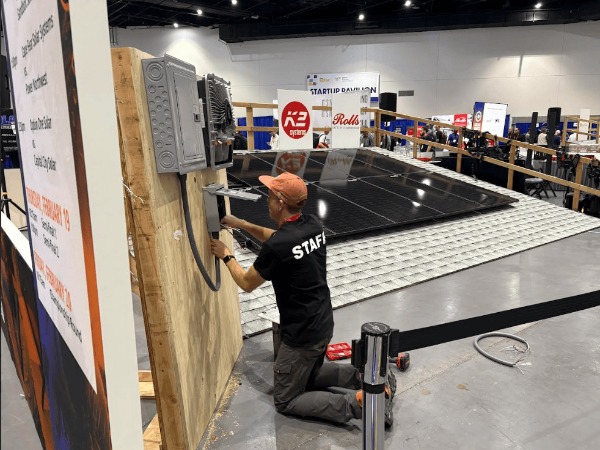New standards, new skills: Solar workforce training efforts scale up across the U.S.

A national push to standardize and scale clean energy job training is beginning to show results. This push is coming from both nationwide associations (as part of their organizational goals) and dedicated industry professionals (as part of their own personal mission).
Registered Apprenticeships on the rise
We’ll start with the associations. According to a new report released July 28, the Interstate Renewable Energy Council (IREC), IWSI America, and a network of collaborators have helped grow the number of Registered Apprenticeships (RA) in clean energy from just 15 to over 1,000 in two years — a 65-fold increase.
The report, Expansion of Registered Apprenticeship Programs in Clean Energy, details the impact of the Apprenticeships in Clean Energy (ACE) Network, a federally funded initiative designed to support the creation of industry-aligned RA programs across the country. The effort comes as clean energy jobs — now employing nearly 3.5 million Americans — continue to grow at twice the rate of the overall U.S. labor market.
“Clean energy companies need a pathway to hire and retain thousands of skilled employees, and Registered Apprenticeships perfectly fit the bill,” said Susan Biszewski-Eber, senior manager of apprenticeship programs at IREC. “We look forward to expanding our efforts to develop even more apprenticeship opportunities in clean energy sectors like solar and storage, home energy performance, EVs, and many more.”
The ACE Network, which received funding from the U.S. Department of Labor through June 2025, provides free technical assistance to help employers and training organizations launch Registered Apprenticeship programs. In just two years, the network has:
- Supported the registration of over 1,000 apprentices
- Provided direct assistance to more than 200 employers
- Developed three National Guideline Standards (NGS) for occupations including Construction Craft Laborer, Weatherization Technician, and Energy Auditor
- Piloted innovative new RA models for heat pump installation and clean energy digital media roles
IWSI America, which served as the lead technical assistance provider, leveraged international best practices to help employers navigate RA registration and compliance. “Together, we’re cultivating a pipeline of skilled talent that fuels innovation and long-term resilience in the fast-evolving clean energy economy,” said Nicholas Wyman, CEO of IWSI America.
Amicus tackles O&M training
Operations and maintenance (O&M) in solar and energy storage is a crucial area of focus right now. 1) Installers are looking to expand services beyond new installations, 2) existing projects are plagued by workmanship, underperformance and safety issues, 3) there is a general lack of O&M technicians and adequate training programs for said technicians.
Amanda Bybee is on a mission to change that. Bybee is the CEO of Amicus O&M Cooperative, a network of vetted solar and battery operations and maintenance providers with standardized tools, templates, and training programs. Bybee and Amicus have worked with SEIA and ACP to create the first-ever ANSI standard for solar technician training and certification.
ANSI/SEIA 301-2025, the Solar and Energy Storage Operations and Maintenance Technician Training American National Standard, educates technical professionals on maintaining solar and storage systems to maximize performance, longevity, and safety. It also provides specifications for scheduled maintenance, system monitoring, safety checks, and record keeping, ensuring more reliable systems that enhance the resilience of the electric grid.
SEIA will launch its new professional and company certification programs in November 2025, which will provide a pathway for industry-wide recognition of compliance with the ANSI/SEIA standards. For individuals, the certification requires passing an exam to demonstrate understanding of the standard.
Hear Bybee talk about that framework and the consensus-building effort in this interview with Omnidian:
Workforce headwinds remain
Despite the momentum, the IREC report highlights several structural challenges that could hamper further scale. Chief among them: the lack of Department of Labor recognition for Solar Installer as an official occupation. And I can’t image that will change any time soon under the current anti-solar administration. Other barriers include intermediary restrictions on the RAPIDS database and inconsistent RA approval processes across state lines. To address these issues, the IREC report recommends streamlining federal and state-level RA processes, expanding NGS coverage to emerging clean energy roles, and providing long-term support for sector-specific apprenticeship intermediaries.





Comments are closed here.